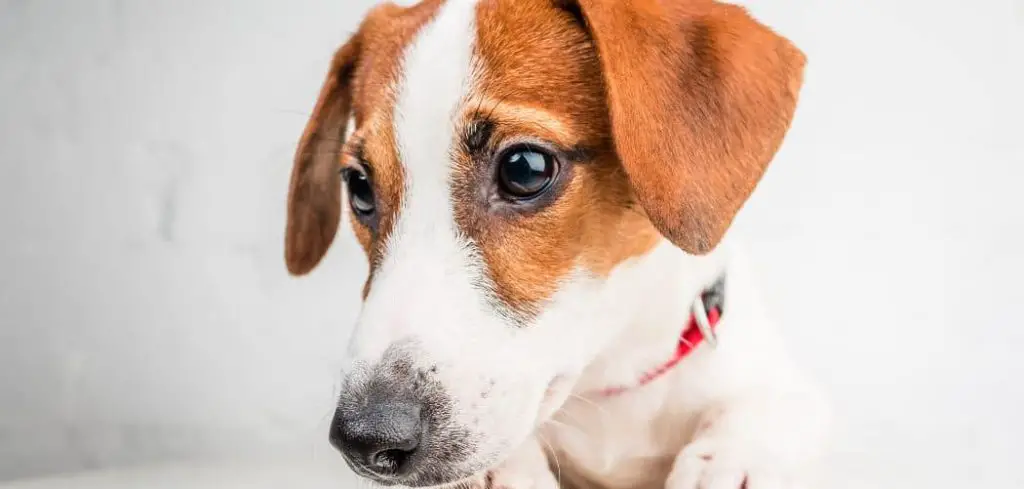Excessive gas in dogs can leave owners worried and frustrated, especially when it’s frequent or accompanied by a foul smell.
Dogs passing gas occasionally is normal, but when your pup is excessively gassy, it can be unpleasant for both of you and may point to underlying issues.
We outline the common reasons for excessive gas in dogs, what you can do at home, and when to seek veterinary help.
Dog Excessively Gassy — Why It Happens
Excessive gas in dogs can result from eating too quickly, dietary sensitivities, changes in gut bacteria, or more serious conditions like pancreatitis or inflammatory bowel disease. Some cases are harmless, while others may signal a health concern that needs veterinary care.

Dog Excessively Gassy: Common Causes
Eating Too Quickly
One of the most common reasons dogs become excessively gassy is because they eat too fast.
When dogs gulp down food rapidly, they swallow large amounts of air along with their meal. This trapped air moves into the digestive tract and exits as flatulence.
You might notice your dog burping, bloating, or passing more gas right after eating. While it may not always be dangerous, chronic gulping can stress the digestive system and make excessive gas a regular issue.
Read more: Dog drooling excessively (What it means)
Dietary Intolerance
Just like people, dogs can have sensitivities or intolerances to certain foods. Ingredients like dairy, soy, grains, or specific proteins can ferment in the stomach and intestines, producing gas.
If your dog becomes excessively gassy every time they eat a certain kibble or treat, it could be linked to an intolerance.
This often comes with other signs like diarrhea, itching, or frequent stomach noises.
High-Fat or Low-Quality Diet
Foods that are high in fat, overly processed, or filled with low-quality fillers can make your dog’s digestive system work harder than it should. As the gut struggles to process such meals, excess fermentation occurs, leading to foul-smelling gas.
Owners often report that switching from a low-quality kibble to a balanced, higher-grade diet helps dramatically reduce flatulence.
Poor nutrition doesn’t just cause gas — it can also weaken the immune system over time.
Gastrointestinal Parasites
Worms and other parasites can upset your dog’s digestive tract and cause excessive gas. When parasites are present, the gut struggles to absorb nutrients properly, and fermentation increases.
If your dog is gassy along with weight loss, diarrhea, or a dull coat, intestinal parasites could be the cause.
Regular deworming and stool checks are key to keeping this from becoming a long-term problem.
Pancreatitis
The pancreas helps break down fats and proteins. When it becomes inflamed (pancreatitis), digestion is disrupted, leading to bloating, abdominal discomfort, and excessive gas.
Dogs with pancreatitis may show other signs like vomiting, lethargy, or refusing food. This condition is painful and requires urgent veterinary treatment to prevent serious complications.
Inflammatory Bowel Disease (IBD)
Chronic digestive inflammation, such as IBD, can make your dog’s gut hypersensitive. Gas builds up more easily, along with diarrhea, vomiting, and weight loss.
While occasional flatulence isn’t alarming, excessive gas paired with ongoing digestive symptoms could point to IBD or another chronic condition.
Managing this usually requires long-term care with your vet, often involving diet changes and medication.
What to Do If Your Dog Is Excessively Gassy
If your dog is excessively gassy but otherwise acting normal, there are a few things you can try at home. Start by reviewing their diet — sudden food changes or poor-quality kibble often lead to gas. Transitioning to a higher-quality food with fewer fillers may improve digestion.
Slowing down your dog’s eating can also help. Using a slow-feeder bowl, puzzle feeder, or simply dividing meals into smaller portions prevents them from swallowing excess air.
If you suspect food intolerance, try switching to a limited-ingredient diet under your vet’s guidance. Keep track of what foods trigger symptoms.
Encouraging daily exercise supports healthy digestion and reduces bloating. A short walk after meals can help your dog pass gas naturally without building up discomfort.
When to Call or Visit Your Vet
While occasional gassiness isn’t unusual, some signs mean it’s time to seek professional help. If your dog’s gas is accompanied by vomiting, diarrhea, or loss of appetite, these could point to a more serious digestive condition.
Persistent bloating, abdominal pain, or a sudden distended belly may signal bloat (gastric dilatation-volvulus), which is a life-threatening emergency. Dogs with bloat require immediate veterinary care.
Chronic gas that doesn’t improve with dietary adjustments also deserves a vet visit. Your veterinarian can run tests to check for parasites, pancreatitis, IBD, or other gastrointestinal disorders.
Always trust your instincts — if your dog seems uncomfortable, in pain, or unusually lethargic alongside excessive gas, don’t wait to get help.
Read more: Dog licking paws excessively (Causes and solutions)
Key Takeaway
Excessive gas in dogs is often linked to diet, eating habits, or minor digestive upsets, but it can sometimes point to more serious issues like pancreatitis, parasites, or IBD. Paying attention to what triggers your dog’s gas, improving their diet, and slowing down mealtimes can make a big difference.
If the gas is frequent, foul-smelling, or paired with other troubling symptoms, it’s safest to have your vet investigate. With the right care and attention, most dogs can get relief and enjoy a healthier, more comfortable digestive system.
